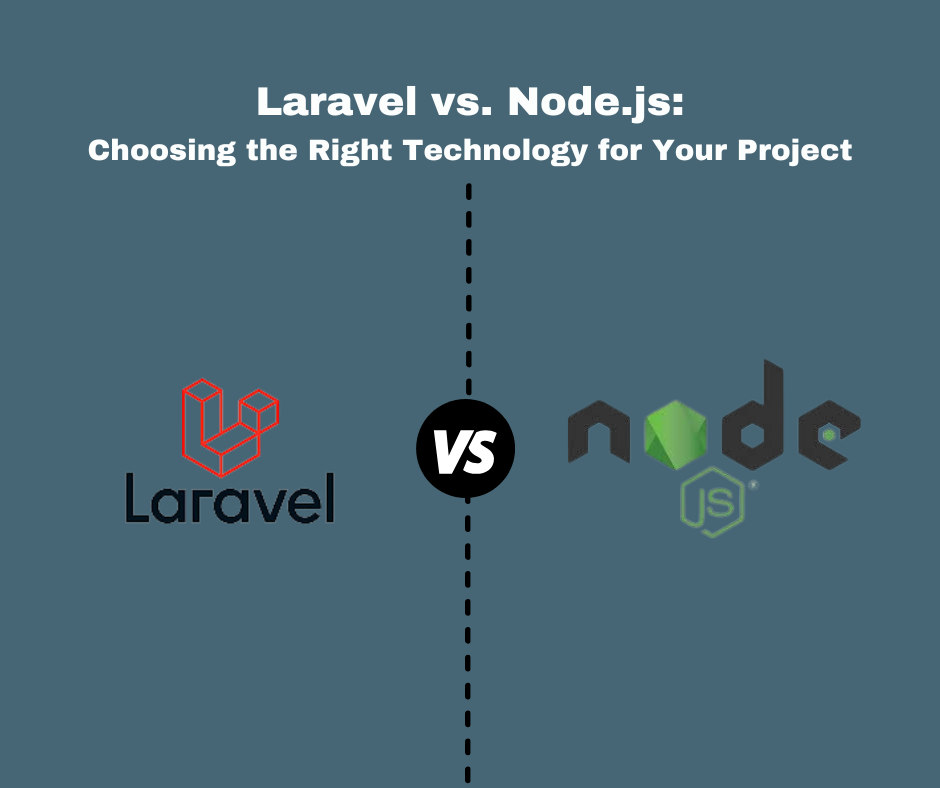The perfect development project requires the best technology, but choosing one is far from easy. And in such cases, the two widely used options are Laravel and Node.js. Both are popular but cater to different types of applications. Understanding what they are, their strengths and weaknesses can help you decide which is the one for your needs.
This article will explain Laravel and Node.js, their pros and cons, and their use cases. It will also compare key areas like ease of use, performance, scalability, etc. In the end, you’ll know which technology is most suitable for your project.
What is Laravel?
Laravel is an open-source PHP framework used to build web apps. Pivotal Labs released the code in 2011, making it an easy, elegant configuration for a coding web application. Laravel has a lot of built-in features like automated testing, database migration, and security features.
Pros of Laravel
►Developer-Friendly: Laravel’s syntax is clean and easy to read, making it a favourite among developers.
►Comprehensive Tools: Laravel includes features that streamline development from routing to caching.
►Security Features: It prevents common vulnerabilities as such SQL injection and cross-site scripting.
►Active Community: Laravel has a great community and considerable number of tutorials, plugins etc.
Stat to Note
According to W3Techs (2023), 75.5% of all websites use PHP and Laravel is one of the most popular PHP frameworks.
Cons of Laravel
►Performance Limitations: Laravel offers good performance for most projects; however, it may not be as efficient as some alternatives for managing high-traffic, real-time applications.
►Learning Curve: Laravel’s methodologies can be challenging for developers new to the PHP framework or MVC architecture.
Best Use Cases for Laravel
✅E-commerce Websites: Laravel’s secure and scalable built-in suite makes it an ideal choice for your business.
✅Content Platforms: Ideal for blogs, forums, and CMS-based platforms.
✅Custom Web Applications: It’s perfect for developing custom, feature-rich solutions for business needs.
What is Node.js?
Node.js is a JavaScript runtime environment that enables developers to create server-side web applications. First released in 2009, it is known for its non-blocking, event-driven architecture that can be used for applications that need to transfer real-time data such as chat or online gaming.
Pros of Node.js
►Fast and Efficient: Google’s V8 engine powers Node.js; known for being a high-speed execution engine.
►Asynchronous Programming: It allows for the simultaneous handling of multiple requests resulting in improved performance for real-time applications.
►Unified Codebase: JavaScript isn’t just for the front or back end, it’s both and enables faster development.
►Extensive Library Support: With over 2.5 million packages in npm, Node.js has a tool for just about everything.
Stat to Note
A Node.js Foundation performance report states that Node.js can do 20,000+ concurrent requests efficiently.
Cons of Node.js
►Callback Issues: Node.js is asynchronous, which means code can get quite complex and nested.
►Package Quality Concerns: Some badly maintained libraries present a risk in the vast npm ecosystem.
Best Use Cases for Node.js
✅Real-Time Applications: Works perfectly for chat apps, live streaming and online gaming.
✅APIs and Microservices: Node.js is frequently used for building RESTful APIs
✅Scalable Applications: Ideal for startups and projects that need flexibility to expand an increasing user base.
Laravel vs. Node.js: Key Comparisons
To decide which technology suits your project, let’s compare them based on essential factors:
1. Ease of Use
►Laravel: It provides a structured environment with a clear coding style. It is easier to adopt, especially for people familiar with PHP.
►Node.js: Simple syntax and a single language for front-end and back-end make it easier for JavaScript developers.
Fact: According to the Stack Overflow Developer Survey 2023, JavaScript is the most widely used programming language, with 65.36% of developers favouring it, giving Node.js an edge for accessibility.
2. Performance
►Laravel: While performs great for most web applications, Laravel may not be the best choice for high-traffic, real-time applications.
►Node.js: Node.js’s asynchronous model allows it to process thousands of requests per second, making it faster in real-time scenarios.
Example: Companies like Netflix reported a 70% reduction in startup time after switching to Node.js.
3. Scalability and Flexibility
►Laravel: Laravel has excellent scaling capabilities, especially when combined with caching and optimised queries.
►Node.js: Node.js is designed to scale horizontally, and supports microservices architecture.
Fact: Uber, which handles 14 million rides daily is powered by Node.js.
4. Security
►Laravel: Comes with built-in features like CSRF tokens and input sanitization to provide security.
►Node.js: Security is flexible, though it depends on the third-party libraries, which can be a concern.
Note: In its 2023 web application security report, Synk found that 68 per cent of web app security breaches are the result of vulnerabilities in third-party libraries, indicating the importance of being good at choosing packages in Node.js.
5. Support
►Laravel: Without a doubt, Laravel has a dedicated community that is great at helping other developers troubleshoot problems and provides detailed documentation for other new and experienced developers to learn from.
►Node.js: Node.js also has a big community, but it has a less centralized support ecosystem which means that developers have to sift through the npm packages to find a solution.
Fact: Developers find the solutions for Laravel framework-specific requirements from Laravel’s curated community resources much more easily than in the case of Node.js.
Conclusion
Both Laravel and Node.js are excellent technologies, but they cater to different needs:
►Laravel is your choice if you require secure and PHP-based applications, e.g. e-commerce websites or content platforms.
►Use Node JS for your project if it demands real-time, scalable and high-performance architecture like Large-scale APIs, chat apps etc.
For the best results, consider your project’s requirements and long-term goals. Partnering with a professional Laravel development company or leveraging Node.js development services can ensure a successful outcome tailored to your needs.
By selecting the right technology, you can set the foundation for a web application that performs exceptionally and scales effortlessly.




